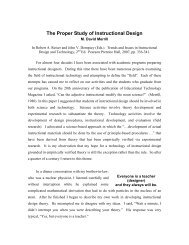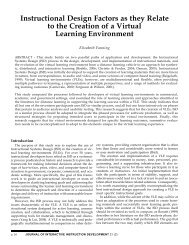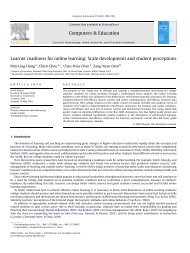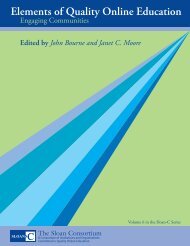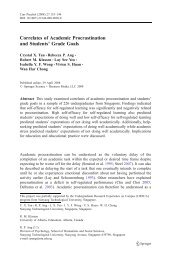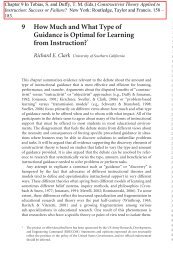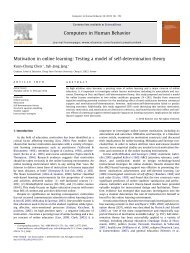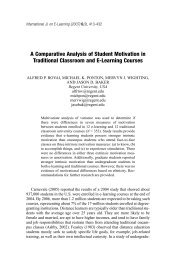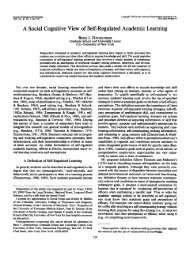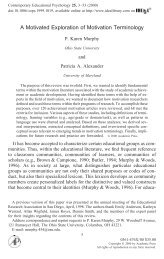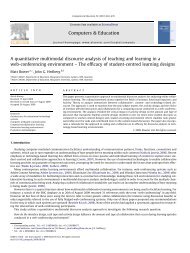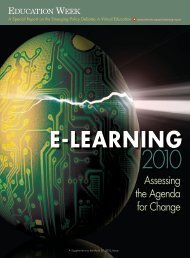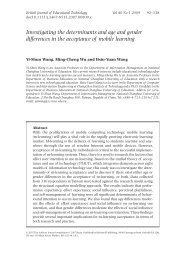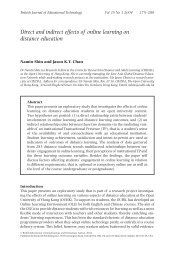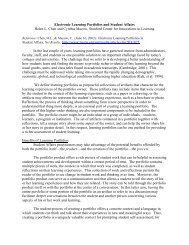Characteristics of distance learners: research on ... - Anitacrawley.net
Characteristics of distance learners: research on ... - Anitacrawley.net
Characteristics of distance learners: research on ... - Anitacrawley.net
Create successful ePaper yourself
Turn your PDF publications into a flip-book with our unique Google optimized e-Paper software.
18 Y. Wang et al.<str<strong>on</strong>g>distance</str<strong>on</strong>g> learning. They identified demography, motivati<strong>on</strong>, experiences, obstacles, and theenvir<strong>on</strong>ment <str<strong>on</strong>g>of</str<strong>on</strong>g> <str<strong>on</strong>g>distance</str<strong>on</strong>g> <str<strong>on</strong>g>learners</str<strong>on</strong>g> as significant factors. Elsewhere, Halsne and Gatta (2002)adopted the Mental Measurements Yearbook (Impara and Plake, 1998) and Barsch’s (1996)Learning Style Inventory to summarize the characteristics <str<strong>on</strong>g>of</str<strong>on</strong>g> <str<strong>on</strong>g>distance</str<strong>on</strong>g> <str<strong>on</strong>g>learners</str<strong>on</strong>g>. From this theyidentified demography, occupati<strong>on</strong> and occupati<strong>on</strong>al status, educati<strong>on</strong>al background, time availableper week, learning style and choice <str<strong>on</strong>g>of</str<strong>on</strong>g> courses as important variables. We can c<strong>on</strong>cludefrom the above that <str<strong>on</strong>g>research</str<strong>on</strong>g> into psychological and behavioural characteristics <str<strong>on</strong>g>of</str<strong>on</strong>g> web-based<str<strong>on</strong>g>learners</str<strong>on</strong>g> is very varied and lacks a c<strong>on</strong>sistent approach. When compared with traditi<strong>on</strong>al face t<str<strong>on</strong>g>of</str<strong>on</strong>g>ace learning <str<strong>on</strong>g>distance</str<strong>on</strong>g> learning differs in the way that teachers are separated by time and space.Online <str<strong>on</strong>g>distance</str<strong>on</strong>g> <str<strong>on</strong>g>learners</str<strong>on</strong>g> need to manage their learning much more and in this way they are <str<strong>on</strong>g>of</str<strong>on</strong>g>tenrequired to be more self-directed and to m<strong>on</strong>itor their own thinking and acti<strong>on</strong> as they worktowards the objectives <str<strong>on</strong>g>of</str<strong>on</strong>g> the course. Zimmerman (2002) suggests that learning motivati<strong>on</strong>, learningstrategy, self-efficacy and attributi<strong>on</strong> for success and failure are all important psychologicalvariables in this kind <str<strong>on</strong>g>of</str<strong>on</strong>g> learning. Ying WANG et al. (2006) suggest that important psychologicalcharacteristics <str<strong>on</strong>g>of</str<strong>on</strong>g> <str<strong>on</strong>g>distance</str<strong>on</strong>g> <str<strong>on</strong>g>learners</str<strong>on</strong>g> include learning motivati<strong>on</strong>, self-efficacy, attributi<strong>on</strong>s, andlearning strategy. Aside from these psychological characteristics, the literature shows an interestin learning results as the focus for analysis. Oxford et al. (1993) identified motivati<strong>on</strong> asthe key variable in a study <str<strong>on</strong>g>of</str<strong>on</strong>g> Japanese-language students using satellite televisi<strong>on</strong> (Zhang &Sun, 2003).Romainville (1994) and Bessant (1997) found that successful students are more aware <str<strong>on</strong>g>of</str<strong>on</strong>g> thelearning strategies and procedures they use. They also found a significant correlati<strong>on</strong> betweenlearning strategy and learning results. Jegede and Fan (1999) found that the extent to which<str<strong>on</strong>g>distance</str<strong>on</strong>g> <str<strong>on</strong>g>learners</str<strong>on</strong>g> used a cognitive strategy was str<strong>on</strong>gly c<strong>on</strong>nected to their meta-cogniti<strong>on</strong>.Despite this, it was not possible to determine whether <str<strong>on</strong>g>learners</str<strong>on</strong>g> with high marks use cognitivestrategies more effectively than those with low scores.Romainville (1994) discovered that high learning scores are correlated with <strong>on</strong>line <str<strong>on</strong>g>learners</str<strong>on</strong>g>who actively use meta-cogniti<strong>on</strong> in their cognitive process. Chen (2004) <str<strong>on</strong>g>research</str<strong>on</strong>g>ed the relati<strong>on</strong>shipbetween learning strategy and the learning results <str<strong>on</strong>g>of</str<strong>on</strong>g> <str<strong>on</strong>g>distance</str<strong>on</strong>g> <str<strong>on</strong>g>learners</str<strong>on</strong>g> at the Network Educati<strong>on</strong>College <str<strong>on</strong>g>of</str<strong>on</strong>g> Renmin University <str<strong>on</strong>g>of</str<strong>on</strong>g> China. The study discovered that the individual results <str<strong>on</strong>g>of</str<strong>on</strong>g> <str<strong>on</strong>g>learners</str<strong>on</strong>g>have a str<strong>on</strong>g correlati<strong>on</strong> with the learning strategy adopted. Elsewhere, many other scholars haveidentified that high-scoring students are able to obtain help in effective ways (Daubman & Lehman,1993; Grays<strong>on</strong>, Clarke, & Miller, 1995; Karabenick & Knapp, 1991; Newman & Schwager, 1995;Ryan & Hicks, 1997).Zhang and Sun (2003) suggest that <str<strong>on</strong>g>learners</str<strong>on</strong>g> able to manage their own learning are closelyc<strong>on</strong>nected with those having good computer skills. Joo, B<strong>on</strong>g, and Choi (2000) emphasize <str<strong>on</strong>g>learners</str<strong>on</strong>g>’computer self-efficacy as an important factor in determining <strong>net</strong>work learning results. Jegedeand Fan (1999) carried out comparative <str<strong>on</strong>g>research</str<strong>on</strong>g> <strong>on</strong> attributes <str<strong>on</strong>g>of</str<strong>on</strong>g> <str<strong>on</strong>g>distance</str<strong>on</strong>g> <str<strong>on</strong>g>learners</str<strong>on</strong>g> and dividedstudents into a high-mark group and a low-mark group. They discovered that <str<strong>on</strong>g>learners</str<strong>on</strong>g> with theneed for high-marks will show more self-reliance and that this attribute is related to improvedlearning results, while Schunk (1989) found that some <str<strong>on</strong>g>learners</str<strong>on</strong>g> had an adjustment system thathelped modify their potential individual achievement and self-efficacy.Present <str<strong>on</strong>g>research</str<strong>on</strong>g> indicates that learning motivati<strong>on</strong> and having a learning strategy are importantaspects <str<strong>on</strong>g>of</str<strong>on</strong>g> self-management for <str<strong>on</strong>g>learners</str<strong>on</strong>g> and that they have a significant effect <strong>on</strong> learning results.As two important characteristics <str<strong>on</strong>g>of</str<strong>on</strong>g> <str<strong>on</strong>g>distance</str<strong>on</strong>g> <str<strong>on</strong>g>learners</str<strong>on</strong>g>, how do these two comp<strong>on</strong>ents affect learningresults? How are they related? How do the other relevant factors such as self-efficacy andattributi<strong>on</strong> affect learning results? What are the relati<strong>on</strong>ships am<strong>on</strong>g these psychologicalvariables? Exploring these questi<strong>on</strong>s will enable us to identify some psychological characteristics<str<strong>on</strong>g>of</str<strong>on</strong>g> adult <str<strong>on</strong>g>distance</str<strong>on</strong>g> <str<strong>on</strong>g>learners</str<strong>on</strong>g>, to modify instructi<strong>on</strong>al strategy and to improve support in <str<strong>on</strong>g>distance</str<strong>on</strong>g>instructi<strong>on</strong>. It may also help to develop the motivati<strong>on</strong> <str<strong>on</strong>g>of</str<strong>on</strong>g> <str<strong>on</strong>g>learners</str<strong>on</strong>g> and change their learning



